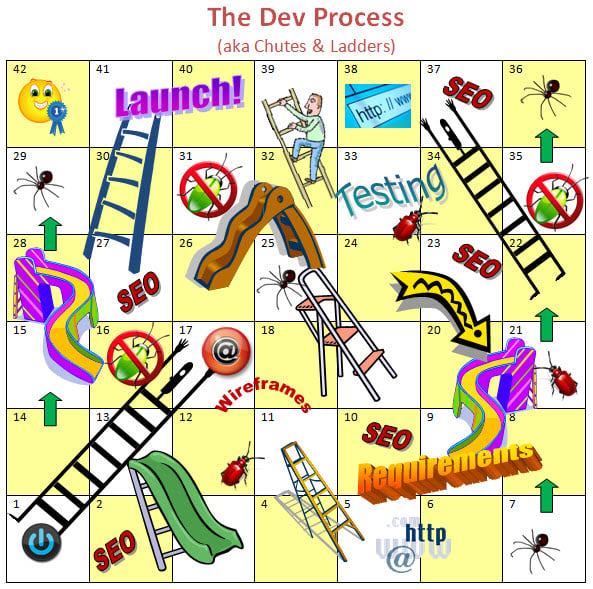
Building SEO into the Development Process
So what does the dev lifecycle look like, well I’ve always likened it to the game of Chutes and Ladders. As you move through the process, you run across chutes and ladders that either launch you forward or move you back 3 spaces.

However, in most organizations, it’s not as cut and dry as just having the SEOs and developers working together. Often times a project team includes a project manager, business analyst, product manager, QA engineer, SEO, designer, development lead and various other team members. So, how do you make certain that the SEO efforts don’t fall through the cracks? What are the best ways to get SEO into the dev process? Who are the key players? And what happens when SEO doesn’t make it into the process?
Ask the Experts
Having come from a development background, I have been a part of many dev projects and have specifically worked on SEO related projects both large and small scale. I asked a few experts to also weigh in and give their perspective on making SEO part of the development lifecycle.
.jpg) Jessica Bowman is well-known in the SEO community and runs an SEM / SEO In-House Blog. You can often find her speaking or moderating in-house SEO sessions at numerous conferences throughout the year. Just next week she’ll be speaking on the panel "In-House SEO: Structuring the Organization for Success" at SES San Jose [I'll be there as well, covering it for the MozPlex, say hello if you see me!]. I’ve heard her speak several times and asked her to weigh in on getting SEO into the development process.
Jessica Bowman is well-known in the SEO community and runs an SEM / SEO In-House Blog. You can often find her speaking or moderating in-house SEO sessions at numerous conferences throughout the year. Just next week she’ll be speaking on the panel "In-House SEO: Structuring the Organization for Success" at SES San Jose [I'll be there as well, covering it for the MozPlex, say hello if you see me!]. I’ve heard her speak several times and asked her to weigh in on getting SEO into the development process. Fran Larkin is the Senior Product Manager for Simply Hired. He’s responsible for the job seeker experience and SEO on SimplyHired.com as well as business development for over 5,000 Job-a-matic publishers, including MySpace, BusinessWeek, CNNMoney.com and The Washington Post. [Whew!] I worked directly with him on an in-depth Site Audit a couple months ago, and have seen firsthand how quickly some of the SEO initiatives have made it to production.
Fran Larkin is the Senior Product Manager for Simply Hired. He’s responsible for the job seeker experience and SEO on SimplyHired.com as well as business development for over 5,000 Job-a-matic publishers, including MySpace, BusinessWeek, CNNMoney.com and The Washington Post. [Whew!] I worked directly with him on an in-depth Site Audit a couple months ago, and have seen firsthand how quickly some of the SEO initiatives have made it to production.Where Does SEO Fit into the Dev Process
When an organization is about to begin a new development project, how and where does SEO fit into that process? Every company will be slightly different, but the ideas are generally the same.Jessica Bowman:
“The shorter list would be where doesn’t SEO go into the development process? SEO needs to be intricately weaved throughout every aspect of the development life cycle from inception to QA testing: identifying the ROI of the project when you incorporate SEO, sitting in requirements meetings, collaborating on wireframes BEFORE they are presented to the project team and contributing detailed SEO requirements to project documentation and QA Testing (or have the QA testing team test for SEO).”Fran Larkin:
"Simply Hired is an extremely job seeker-focused company, so from the very beginning of our product planning efforts, we work hard to align our user experience goals with an SEO-friendly site architecture."
Making Sure SEO Doesn’t Fall Through the Cracks
With all the back and forth that happens on that journey through the game of Chutes and Ladders… aka the dev lifecycle, how do you make sure that your SEO efforts don’t fall through the cracks?Jessica Bowman:
SEO needs to be involved every step of the way – in some areas an SEO team needs to be more intricately involved in the nitty-gritty details than a website product manager, which is surprising to most companies, and even many SEOs. What companies do not realize is that the role of an SEO is not like any other function in the organization. What I tell clients is that SEO needs to be two-peas-in-a-pod with Website Product Managers and Project Managers (at some companies this is the same role).Fran Larkin:
Website Product Managers
Project Managers
- Ultimately responsible for the website and its success.
- It’s in their best interest to maximize traffic, which includes SEO traffic.
- Get a product manager to buy into SEO fully.
They can become your most coveted SEO champion, because they are in a position that both IT and business sponsors will listen to.
One of the things an SEO should do is comb through the project plan to identify where SEO needs to be involved in a project because most project managers are not experienced at integrating SEO into the right places of the development life cycle. If a company hasn’t integrated SEO into a project before, it’s worth the money to pay a consultant with experience integrating SEO into the development process for a given project, and once you learn, you can transfer those insights into future projects.
- Oversee every minute detail that is completed for a project.
- Organize meetings and ensure the right people are involved in reviews and approvals.
- It’s vital for project managers to fully understand how and why SEO needs to be involved. They are the ones who can make it happen.
“We explicitly document the SEO requirements of each new product that we launch – everything from the URLs to individual nofollows. As a result, our dev team has the detail that they need, and our QA team checks to ensure that the SEO requirements function as specified,”
The Key Players
 This is a big one for me, the “who” of the project. Does every person who’s a part of the project need to have some understanding of optimizing websites to be search engine friendly? Or is it only necessary for specific people to watch and care about the SEO tasks? Is it ok for developers to not understand why they need to set up 301 redirects, or is the fact that they know how to do it good enough?
This is a big one for me, the “who” of the project. Does every person who’s a part of the project need to have some understanding of optimizing websites to be search engine friendly? Or is it only necessary for specific people to watch and care about the SEO tasks? Is it ok for developers to not understand why they need to set up 301 redirects, or is the fact that they know how to do it good enough?Jessica Bowman:
"It’s best when everyone on a project has an understanding of SEO because then everyone can look out for SEO on each project. The most important roles to understand SEO include:Fran Larkin:
When looking at the roles, focus on each role by project, rather than team. Often times, especially in large organizations, the usability, design and programming teams are split up into different projects, each working on a different release and your ‘seo expert’ within the programming team may not be involved on all projects. It’s vital that the leads assigned to any given project have intimate knowledge about SEO, or work closely with the SEO team in a way that they have never worked with any other function in the company."
- Lead programmer(s)
- Lead Usability Designer(s)
- Product manager(s)
- Project manager(s)
Simply Hired is an extremely job seeker-focused company, so from the very beginning of our product planning efforts, we work hard to align our user experience goals with an SEO-friendly site architecture.I’d like to add that the Quality Assurance team should have a keen understanding of SEO in general plus they need to know specifically what they are testing. Additionally, the QA team should have a complete set of tools to help them test whether a redirect is for sure doing a 301, or whether the analytics program is tracking correctly for example.
When SEO isn’t a Part of the Process
I have personally seen a site’s traffic plummet when SEO wasn’t taken into consideration. For example, in one case, a section of the site was being moved to a new (and improved – heh) platform. This new platform created two different URLs for the pages, plus the original pages were never 301’d to the new page. Now, the company had 3 different sets of URLs that all lead to the same content and that were all accessible in one way or another (through feeds, site search, in-bound and internal links).Jessica Bowman:
"When SEO isn’t part of the process, you leave money on the table, and throw even more money out the door and in the garbage for good measure. The worst case scenario is that it can wreak havoc on your efforts and can cost thousands of dollars to fix (hundreds of thousands for large organizations and complex websites), it can throw away years of SEO work and tank your rankings and traffic in a single release. A lot is at stake when you make changes to a website, it’s surprising how sometimes the smallest little change that doesn’t seem to relate to SEO can negatively impact the bottom line. For this reason, it’s in a company’s best interest to educate everyone in the company on SEO and keep the SEO team informed on what is happening in each release."Fran Larkin:
SEO issues are treated like any other bugs on the site. We track them, determine the importance and prioritize accordingly.
Where Does That Leave Us?
Every organization and their processes (or lack of processes) are different. What is universal though is the importance of weaving SEO into that process. As both Jessica and Fran mentioned, it’s important to make sure everyone is on board and has an understanding of what SEO is and why it’s important. Finding an SEO proponent within each department will help your efforts immensely.For example, at Simply Hired, they send the marketing and product team to conferences like SES, circulate SEO-related blog posts with the company, and give all new engineers a copy of the Web Developer’s SEO Cheat Sheet to post on their cube wall.
Another way to get people involved is to set up various training courses with different people within the company and ask them to try their new SEO skills on their personal websites. Most people have some sort of website and get a lot more interested in having their personal site rank well in the search engines, than a big corporate site that they have no control over.
What do you do in your organization to make sure SEO doesn’t fall through the cracks? What works and what doesn’t work? Have you learned any lessons you’d like to share?
Game Piece Photo Attribution:
The author's views are entirely their own (excluding the unlikely event of hypnosis) and may not always reflect the views of Moz.




Comments
Please keep your comments TAGFEE by following the community etiquette
Comments are closed. Got a burning question? Head to our Q&A section to start a new conversation.